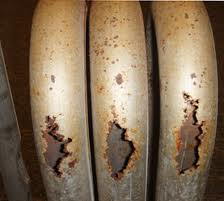What? My Heat Exchanger is Cracked!
- Post By: Greg Crumpton
- Date:
- Category: Blog
 If you utilize natural or LP gas to heat with these are probably the nastiest words you will want to hear this upcoming heating season. The heat exchanger and its integrity are the things that keep you, your family and/or co-workers from breathing the noxious Carbon Monoixide (CO) gas that is created when fossil fuels are burned with in your HVAC systems for heat. To be sure, the heat exchanger isn’t the only device that can contribute to introducing CO into your environment, but surely is of prime concern.
If you utilize natural or LP gas to heat with these are probably the nastiest words you will want to hear this upcoming heating season. The heat exchanger and its integrity are the things that keep you, your family and/or co-workers from breathing the noxious Carbon Monoixide (CO) gas that is created when fossil fuels are burned with in your HVAC systems for heat. To be sure, the heat exchanger isn’t the only device that can contribute to introducing CO into your environment, but surely is of prime concern.
The heat exchanger is the component within the heating section of your system that allows cool (return) air to pass through a chamber with a lot of heat transfer surface area that is hot from the burning gas just on the other side of this thin metal wall. As the cool air passes through the heat exchanger it is warmed to around 120 degrees then pushed through the duct work system (supply air) and delivered to the room.
If this heat exchanger becomes cracked, or any type of hole develops in it, it may allow CO into your working or living space where you could inhale it through normal breathing.
Be safe! Have your HVAC systems serviced and maintained by professionals and heed their recommendations for repairs or replacement when required. Natural gas, propane and other gases are a great way of heating when they are handled in the appropriate way.
If you have any questions regarding this topic, or any of your heating systems, please call AirTight to schedule an appointment. We will educate you on the type of systems you have as well as any requirements to maintain it properly.